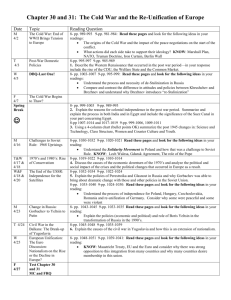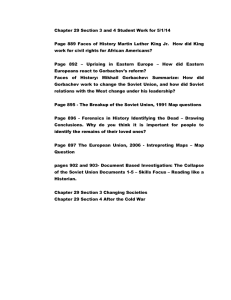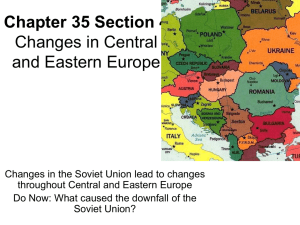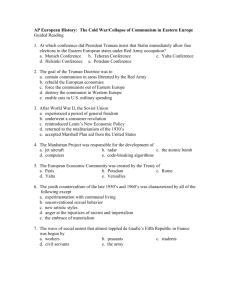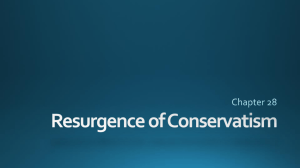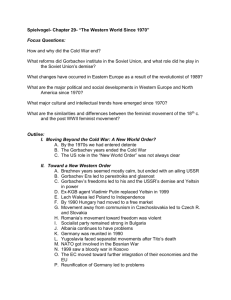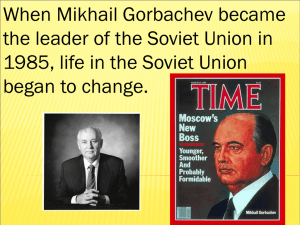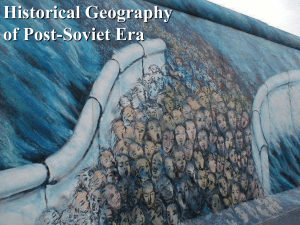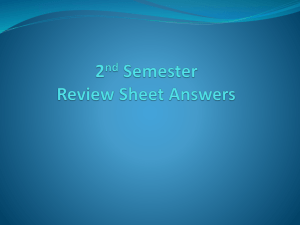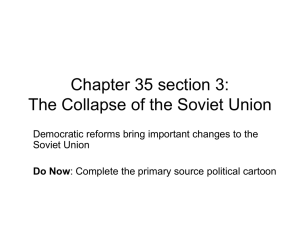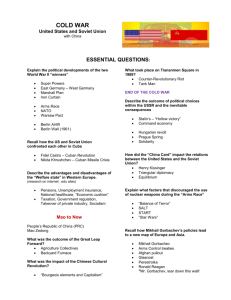1945-71
advertisement
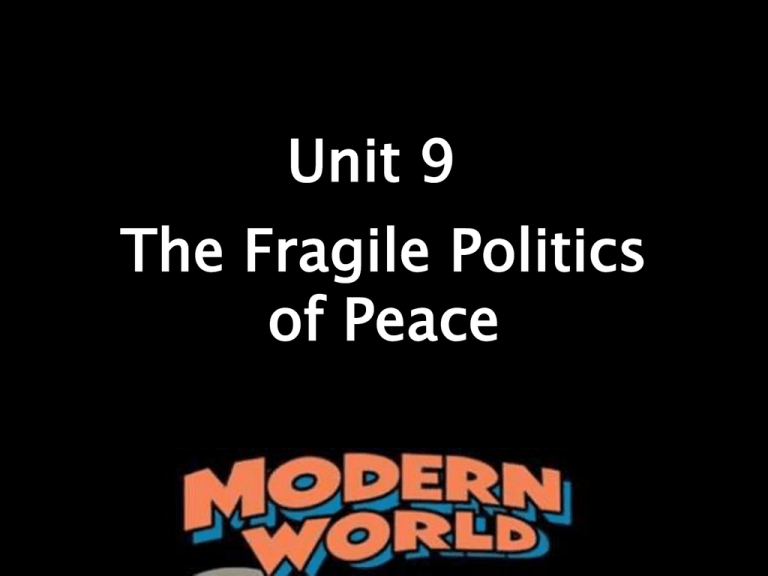
Unit 9 The Fragile Politics of Peace Main Topics Cold War Détente Post Cold War Europe Non-Cold War Europe Cold War Struggle between West and Communism 1945-1991 Soviet-American Relations 1945-71—Cold War Stalin pursued hard line Korea Khrushchev pursued softer line Vietnam Missiles in Cuba SovietAmerican Relations Soviet-American Relations 1972-1991—Detente Détente=relaxation During 1980s Gorbachev began major liberalization of economics Soviet Union 1953—Stalin’s death led to bitter struggle for power Secret Speech Nikita Khrushchev Report to 20th Party Congress February 25 1956 Maintained support for Communist ideals Criticized Stalin’s actions 1945-71 Purges Terror against citizens Stalin's personality cult Yugoslavia 1943-1991—Marshal Tito Defied Stalin, pursuing nationalist policies Stalin tried to bring Tito under Soviet domination Western nations offered aid 1945-71 Allowed Tito to remain independent Germany Nazi war crimes trials in Nuremberg (1945-1946) Berlin Blockade and Airlift (1948-1949) West Germany (German Federal Republic) created (1949) East Germany (German Democratic Republic) created (1949) 1945-71 Divided Berlin Divided Germany Germany Berlin Wall Seals Iron Curtain August 13, 1961—East German border guard escapes to the West Berlin Wall built (1961) June 26, 1963—Kennedy visited the wall Relations normalized between the two Germanies (1972) 1945-71 Eastern Europe—1956 Poland (October) Polish people engaged in strikes and riots Władysław Gomułka pledged a measure of loyalty to Russia Hungary (23 October 23-November 10) Like Poland, people revolted and Imre Nagy pushed for some independence from Russia Soviets could not allow more anti-Soviet moves 1,000s of Hungarians killed as government smashed by Soviets 1945-71 Eastern Europe—1968 Czechoslovakia 1945-71 Alexander Dubcek began liberalization, assuring Soviets of loyalty Warsaw Pact troops, led by Soviets, brought Czechoslovakia back under total Soviet control Economic Aspects Aid Marshall Plan to all of Europe, especially Eastern Europe COMECON—Communist response to Marshall Plan Eisenhower Doct. to Middle East 1945-71 Truman Doct. to Greece & Turkey Peace Corps idealistic volunteers to underdeveloped countries Economic Aspects European Economic Unity European Coal and Steel Community (ECSC) (1952) European Atomic Energy Community (Euratom) (1957) European Economic Community (EEC/Common Market) (1957) European Community (EC) (1986) European Union (EU) (1992) 1945-71 Military Aspects 1945-71 North Atlantic Treaty Organization (NATO) (1948) Australia, New Zealand, and the United States (ANZUS) (1951) Southeast Asia Treaty Organization (SEATO) (1954) China China and Russia became hostile over: Ideological differences Border disputes World Communist leadership 1976—At Mao's death, a thaw 1989—After Soviets left Afghanistan, a normalization 1945-71 Detente 1972-1991 Germanies 1970—Willy Brandt’s Ostpolitik Greater harmony with GDR & Poland 1972—More open relations with GDR, allowing more travel 1972-91 Détente—1972 & 73 1972 Nixon visited Brezhnev in Moscow for summit Two SALT Accords Limited nuclear weaponry 1973 Brezhnev visited US Traveled across country, appearing on TV 1972-91 Signed accords with Nixon Détente—1974-75 1974—Nixon visited Brezhnev in Moscow and Yalta Ford visited Brezhnev in Vladivostok Signed economic and nuclear treaties Discussed arms control Helsinki Pact US, Canada, and Europe Honored post WWII boundaries Agreed 1972-91 to further human rights Détente—1979 SALT II Accord Carter met Brezhnev Further limited nuclear weapons 1972-91 Europe 1980-88 Yugoslavia In 1980, Tito died, leaving power vacuum Albanians in province of Kosovo wanted independence Serbs and Montenegrins demonstrated for protection from the separatists 1980-88 Poland 1979—Pope John Paul II visited Warsaw Polish TV would only show altar John Paul’s visit helped produce, 14 months later, Solidarity movement Illegal strikes in Gdansk inspired by Solidarity 1980-88 Led by Lech Walesa Popular movement, achieved some goals Poland Lech Walesa Timothy Garton Ash "The pope started this chain of events that led to the end of communism. Before his pontificate, the world was divided into blocs. Nobody knew how to get rid of communism. He simply said: ‘Don't be afraid, change the image of this land.’" (Oxford historian) "Without the Pope, no Solidarity. Without Solidarity, no Gorbachev. Without Gorbachev, no fall of Communism." Gorbachev (USSR Party Secretary, 1985-1991) “It (fall of Communism) would have been 1980-88 impossible without the Pope.” Poland 1981—Martial law imposed and Walesa arrested 1982—With increased pressure and economic decline, Walesa released 1981, Time Man of the Year 1983, Nobel Peace Prize 1980-88 Soviet Union In 1985 Gorbachev came to power “We can't go on living like this.” March 10,1985 Glasnost (openness) Perestroika (restructuring) Chaos from: Mixed comm./cap. economy Loss in Afghanistan (1979-89) Challenged politically by Yeltsin 1980-88 1988—Fired him as chief of Moscow's Communist Party Soviet Union Get audio or video 1987—Reagan visited Berlin “Mr. Gorbachev, tear down this wall!” 1988—Gorbachev announced withdrawal of Soviet troops from Eastern Europe 1980-88 End of Cold War 1989 Poland 1989 Formed coalition government including Solidarity members and Communists Soviet Union 1989 Lithuania declared independence Secessionist movements began in: Latvia Estonia The Ukraine Hungary June—Reburied Imre Nagy July—Supreme Court acquitted Nagy of high treason for which he had been executed August—Tore down fence separating it from Austria Let 1,000s of refugees from East Germany into Hungary Refugees then fled into Austria October—Changed from People's Republic into Republic of Hungary 1989 East Germany 1989—Refugees poured into W Germany: 225,000 from East Germany 300,000 from Russia and Poland October 18—Communist East German govt. fell Midnight, November 9/10— New government opened 1989 border with West Germany Rumania 1989 Get video Shortages and economic collapse Nicolae Ceausescu and his wife continued their lifestyle and use of secret police December—bloody demonstrations Eventually Ceausescu's caught, tried, and shot Czechoslovakia Prague government tried to control demonstrations Charter 77 created Communist government collapsed 1989 Vaclav Havel was elected president, beginning democratization Bulgaria & Yugoslavia 1989 December—Announced democratic reforms End of Cold War 1990 Yugoslavia 1990 Communists voted to end 1-party system Ethnic Albanians in Kosovo rioted Slobodan Milosevic elected Serbian president Slovenia voted for independence Russia Gorbachev was jeered in Red Square on May Day May—Yeltsin elected Russian president 1990 Defeated Gorbachev's candidate Germany On October 3 Germany reunited Took on government East German pollution and trappings of West Germany 1990 GERMANY: 1914-1990 Poland On December 9 Lech Walesa elected president 1990 75% of vote Catholic support Hungary 1990 New coalition government formed Romania 1990 First free elections in 53 years End of Cold War 1991 Russia Revolts in Soviet republics as Communists lost power Gorbachev: 1991 Supported new, loosely-governed Soviet Union Denounced Communism Russia August—Hard-liners attempted coup of Gorbachev government Russians, led by Yeltsin, rebelled against coup in Moscow and other cities Yeltsin denounced coup, saving Gorbachev 1991 Russia 1991 Gorbachev ended Communist Party, but it was too late Independence was "won" by Latvia Lithuania Estonia Ukraine Russia On Dec. 25: 1991 Gorbachev resigned New confederation of ex-Soviet republics created Yeltsin became President (1991-1999) Yugoslavia May—Croatia voted for independence October 1991 Serbs shelled Dubrovnik Yugoslav forces bombed Zagreb, Croatian capital Post-Cold War 1992-Present Czechoslovakia 1992—Czechs and Slovaks voted to split Havel resigned 1993—Birth of Czech Republic and Slovakia 1992--> Yugoslavia 1992—Bosnia voted for independence 1995—Officially independent 1998—Milosevic attacked Kosovo when they pushed for autonomy 1992--> 1999—NATO and UN bombed Sarajevo Yugoslavia 2003—Serbia and Montenegro changed FRY into Serbia and Montenegro June, 2006—Montenegro and Serbia voted for separation Feb, 2008—Kosovo became independent 1992--> Russia Putin President of Russian Federation, 1999-2008 Currently Dmitry Medvedev 1992--> Putin as Prime Minister Non-Cold War The Welfare State Post-WWII nationalizing of businesses Sweden and FRG some Italy and Britain more France most All, but Britain, had long-term planning and direct intervention in economy All, including Britain, created welfare states (social safety net) Rise of European centrists In 1980s began to reduce Social Changes Greater social democracy Especially for women Birth control pill Led to negative population growth Created problem for retirement benefits Youth culture Baby boomers Growing immigration from Asia, Middle East and Africa Led to anti-immigrant political parties Socio-Economic Changes Growing middle class More social mobility Prosperity Educational opportunities Consumerism Mass marketing Western industry begins to shift from heavy industry toward services and information processing 1968 Rebellious children of Fascists French bourgeoisie Oppressive Soviet Communism in Eastern Europe Vietnam War Terrorism in Europe 1972—Hostage crisis at the Summer Olympics in Munich, West Germany 1985—Hijacked cruise ship, Achille Lauro, in Mediterranean 1988—Explosion of Pan Am 103 over Lockerbie, Scotland 2004—Bombings of Madrid subway/train 2005—Bombings in London Technology Government-run science Antibiotics Polio vaccine Organ transplants Nuclear power Chernobyl, 1986 Cultural and Intellectual Changes Center of art moved to NYC Thought Postmodernism Existentialism Religion Ecumenical movement Second Vatican Council Evangelical Christianity Unit 9 The Fragile Politics of Peace
